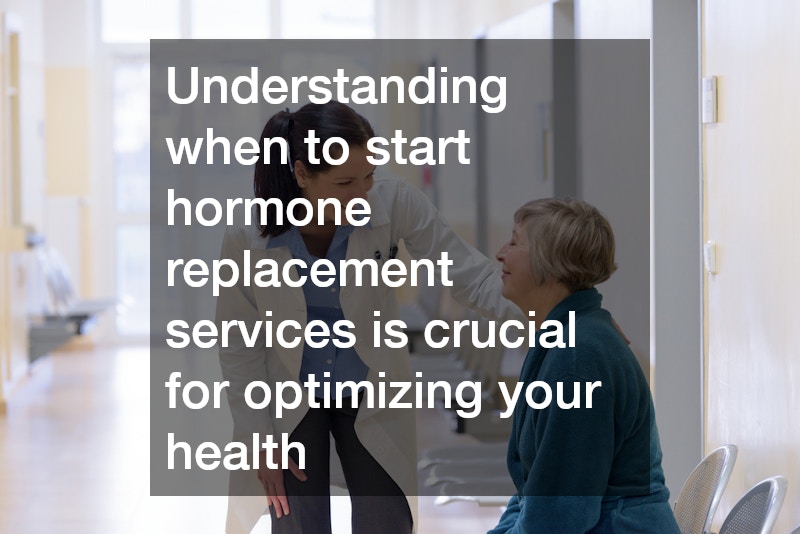Hormone replacement services have gained increased attention in recent years, providing critical support for individuals experiencing hormonal imbalances or changes. These services are frequently sought for a variety of reasons, including menopause, transgender healthcare, and other medical conditions that require hormonal adjustments. The decision to begin hormone replacement therapy (HRT) can be a significant one, with far-reaching impacts on physical and emotional well-being.
In this article, we will explore the essential considerations for when to start hormone replacement services, addressing the optimal timing, available treatment options, and lifestyle adjustments that can help enhance results.
1. What are Hormone Replacement Services?
Definition and Purpose
Hormone replacement services involve the administration of hormones to address hormonal imbalances in the body. For women, HRT typically involves replacing estrogen and progesterone during menopause when natural hormone production decreases. In transgender healthcare, hormone replacement therapy often aims to align an individual’s physical traits with their gender identity, most commonly through the use of estrogen, testosterone, or other hormones.
Risks and Side Effects
While hormone replacement therapies offer numerous benefits, they also come with potential risks. Some risks include blood clots, breast cancer, and an increased risk of stroke, particularly for older women. It’s important to weigh the potential risks against the benefits with the guidance of a healthcare provider.
2. When is the Optimal Time to Start Hormone Replacement?
Age Considerations
Age plays a critical role in determining the best time to start hormone replacement services. For menopausal women, starting HRT within 10 years of menopause onset is typically recommended, as this is when it can be most beneficial in managing symptoms. Starting too early or too late may affect the effectiveness of the therapy.
Timing for Menopausal Women
For women approaching menopause, doctors often recommend hormone replacement services to help manage the abrupt hormonal changes. This typically occurs around the age of 50, but timing can vary. Starting early can ease the transition and reduce long-term risks such as osteoporosis and heart disease.
Monitoring and Adjustments
Hormone replacement therapy isn’t a one-size-fits-all treatment. Regular monitoring and adjustments are essential to ensure the therapy is effective and tailored to the individual’s needs. Blood tests and physical evaluations help track progress and adjust dosage levels to prevent side effects and maximize benefits.
3. How to Discuss Hormone Replacement with Your Doctor?
Preparing for Your Appointment
Before starting hormone replacement services, it’s important to prepare for a thorough discussion with your doctor. Consider your symptoms, goals, and any concerns you may have about the therapy. Writing down a list of questions will help you stay organized during your visit.
Questions to Ask
Some key questions to ask your doctor include: “What are the potential benefits and risks?” “How will we monitor the effectiveness?” “What lifestyle changes should I make?” and “How long should I expect to stay on hormone therapy?”
Sharing Medical History
Your doctor will need a complete medical history to evaluate your eligibility for hormone replacement services. Be honest and thorough, as conditions such as blood clotting disorders or breast cancer may affect your treatment options.
Understanding Your Options
Your healthcare provider will explain the different hormone replacement therapies available, taking into account your medical history and personal preferences. Understanding all options will empower you to make informed decisions.
Follow-up and Monitoring
Hormone replacement therapy requires regular check-ups to assess its effects on your body and adjust treatment as needed. Follow-up appointments will also monitor any potential side effects or complications.
4. What Lifestyle Adjustments Accompany Hormone Replacement?
Diet and Nutrition
A balanced diet rich in vitamins and minerals supports hormone health. Calcium and vitamin D are especially important for women undergoing menopause to help reduce the risk of osteoporosis.
Exercise and Physical Activity
Regular exercise can improve cardiovascular health, reduce stress, and support hormonal balance. Weight-bearing exercises, in particular, are beneficial for bone density.
Stress Management
Chronic stress can disrupt hormone balance. Practices such as yoga, meditation, and mindfulness can complement hormone replacement services by promoting emotional well-being.
Smoking and Alcohol Use
Smoking and excessive alcohol intake can interfere with hormone balance and hinder the effectiveness of hormone therapy. Limiting these behaviors can improve the success of treatment.
Regular Health Check-Ups
Consistent health check-ups are essential to monitor the impact of hormone therapy and ensure overall health. Regular visits with your doctor can help catch any issues early and adjust treatments as necessary.
Understanding when to start hormone replacement services is crucial for optimizing your health. By carefully considering your symptoms, timing, and treatment options, you can work with your doctor to create a personalized plan. Whether you’re navigating menopause, or addressing other health concerns, hormone replacement therapy can significantly improve your quality of life and well-being.
.


